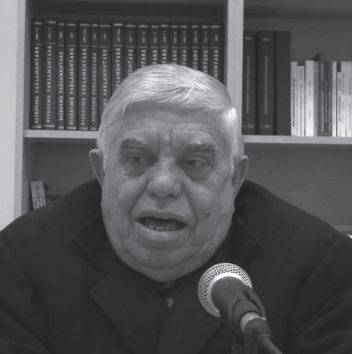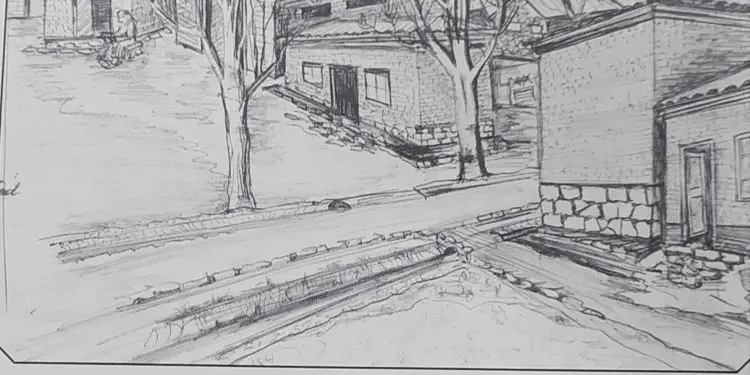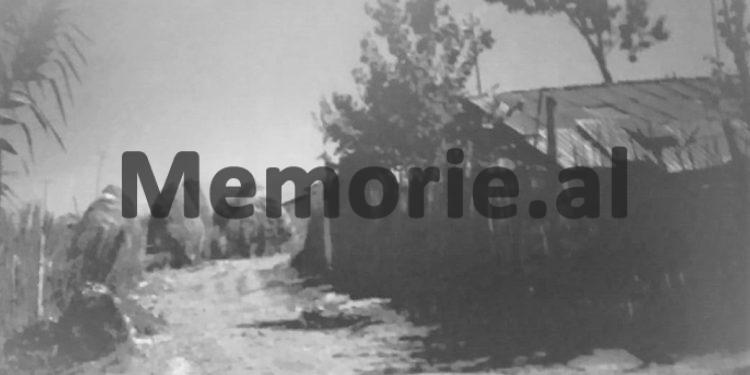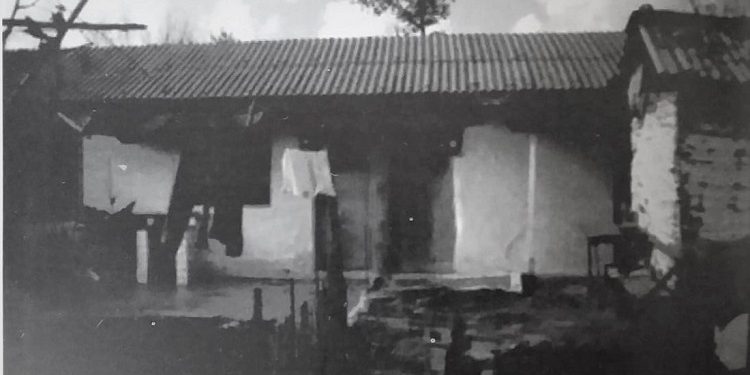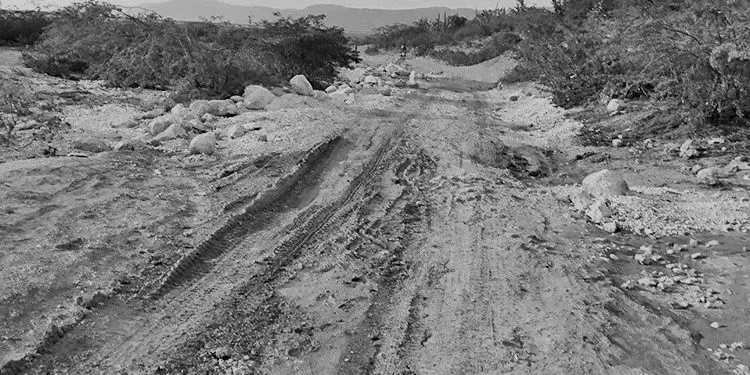By Musa Capani
Memorie.al / It look like a legend, but it happened during the dictatorship. After getting the permit late, 4-year-old Afërdita arrives at the hospital in a serious condition and dies after a few days. Her mother walks alone, with her lifeless daughter in her arms, the road from the hospital to the exile village. Musa Çapani brings the chilling story that Angel Cani, Aphrodite’s cousin, passed on to him. The internees needed permission for everything, even to live. They couldn’t even go to the doctor in town without confirmation from the Internal Affairs Branch, and if they risked their lives while waiting, it didn’t mean that the communist bureaucrats would move their hands any faster. They were “enemies of the people” or relatives of “enemies” and, according to the ideology of the time, deserved only torture and punishment, even if they were children.
This also happened to Afërdita, the 4-year-old daughter of Emin Canes, who had escaped from Albania, together with her brother, Lutfiu. The families of the two brothers were exiled from Bilishti to Gjaze in Lushnje, where the lack of water led to the spread of epidemics. Venus was affected by dysentery. In the camp, there was no health center. In order to receive medical help, one had to go to Lushnje, but the internees could not go anywhere without permission from the branch of the Ministry of the Interior.
When the permit came, the little one was burning with heat. However, in the “29 November” Agricultural Farm sector of Lushnja, not only water and doctor were missing, but also the heart of the managers of that sector or, if it existed, was filled with fear. For the sick little girl, they didn’t even provide any kind of vehicle, not even a stroller, so mother Timja left with the little one in her arms. The full story is told by Musa Çapani, a former political convict, as told to him by his friend, Engjëll Cani, Afërdita’s first cousin.
The angels were vulnerable
That end of summer, for the Cani family, in addition to the pain of being forcibly removed from their hometown, was conveying the torment of a life full of deprivation and the curse of epidemic diseases that found suitable ground, in this forgotten corner of Myzeqe that had turned into an agricultural sector of the “29 November” Agricultural Enterprise and a new internment center in the district of Lushnje.
The sector had been erected for a year and with the completion of the construction of six ground-floor buildings, with four entrances each, it began to be populated mainly with interned families, brought from the area of Devolli and Dibra. At the end of 1956, the two families of the brothers, Lutfi and Emin Cani from Bilishti, were also interned here, who, in order to escape the planned arrest, chose the escape route.
Built in the middle of the field, the biggest difficulty for the newly established sector was the provision of drinking water. Three wells were opened, but the amount of water they extracted was insufficient to meet the needs of the population. So, the inhabitants were taken early in the morning, whoever could fill two buckets of water. The lucky ones who woke up early managed to fill up, while those who didn’t arrive on time were forced to commit sacrilege.
In the newly arrived family, when they didn’t go on time, the bad luck fell on the Angel, who had just turned eight years old, who was tied with a rope, lowered to the bottom of the well and he, with a can, collected the remaining water, the water that could not fill the bucket, which was more mud than water. The difficult conditions, especially the lack of water, caused dysentery to appear in the sector, which did not spare any elderly or children.
In the Cani family, the disease affected the elderly grandmother and the Times mother’s four-year-old daughter. The grandmother coped with the disease with great difficulty, while the disease overcame the little Dita. In the newly created sector, there was no health center, so the sick had to be sent to Lushnje. The permission from the Department of Internal Affairs, (by phone), came late and mother Timja, with her daughter who was burning with fever, in her arms, left for Lushnja on foot.
The leaders of the sector, scared of the consequences if they helped an internee, did not offer any means of transport, even a cart, to take him to the place called “Driver’s Rest”, a small center on the Lushnjë-Fier highway, a center in which there was a possibility of finding a vehicle.
“Driver’s Rest” was approximately in the middle of the Gjaze-Lushnje road, which was about 14 km. tall. He made it there on foot, while from there, to Lushnjë, he found a kind-hearted coachman who helped him. Upon arrival at the hospital, the doctors diagnosed the epidemic disease and admitted him to the infectious ward. In that ward, relatives were not allowed to stay for care and after appearing in the Branch, he took the way back.
On the fourth day, they announced by phone from the hospital that the patient had died. Mother Timja again took the road to Lushnje and returned to Gjaze, with the body of the little one, lifeless, in her arms. He had walked all the way. When he came home, he left his daughter in the hands of his father-in-law and fell to the ground himself, as if dead. The next day, they buried him in a piece of lawn, at the entrance of the sector. It was the first grave in that new cemetery, to which the grandmother’s grave, was added a week later.
After five years, the Cani family was transferred to the mountain cooperative of Kryekukuqi. Now it was reduced. Mother Timja was left alone with her two sons, while mother Ismiani was left alone with her four small children and her father-in-law. The two older daughters were married to fellow sufferers, one in Plug in Lushnje, the other in “Liberation” in Fier. While far from the homeland, the two fugitives, Lutfiu and Emini, the heads of the Can family, had moved, one in Canada and the other in Australia.
In 1963, Lutfiu’s family was transferred to the Grabjan sector of Lushnje, while the family and mother Times, with the guarantee of the communist brother, who took over all the possible consequences, returned to Bilisht and started a normal life, but always under the supervision of the Interior Department and the State Security people who had them under strict surveillance and supervision. After the release from exile, Lutfiu’s family, until 1983, lived in Grabjan, with compulsory residence, but which was free to move without restrictions.
Lutfiu’s eldest son, Angjëlli, even though he was married to a girl from that province, even though he loved his hometown and his uncle’s sons, often made his way to Bilisht. During these visits, together with Ideal, the son of Emin, his uncle, they planned the family escape that they made in the spring of 1983, an escape that made a lot of noise at the time, and that put the “Albanian Invincible Security” in a difficult situation.
Crossing the border of two families of 10 people, the youngest of which was only 6 months old, crossing with a pair of poplar wooden steps, the electrified clone, was a great loss for the “myth of the invincibility of the borders of the motherland” that was trumpeted so strongly at that time.
The coverage of the incident by the Greek state televisions, the interviews with the fugitives by many international televisions, infuriated the Albanian State Security and the high communist leadership of the Labor Party. The most drastic measures were taken for the rest of the remaining family members and for all the families of their relatives and relatives.
With the advent of democracy, at the beginning of the 90s, the remaining part of the Cani family moved to Canada and Australia. After thirty-five years of separation, the Cani brothers were reunited with their wives and all their children.
Old people, tired of life and exhausted by longing, managed to enjoy a few white days in the bosom of their family. The children are settled, they have built their well-being and from time to time the longing for the homeland of the few relatives they have left in Albania, brings them back to their homeland.
On the first trip back to Albania, they went to Gjaze in Lushnje, to find the graves they had left there. They returned heartbroken. Instead of the lawn planned for the cemetery, they found a plot planted with sunflowers, where no trace of their loved ones’ graves had been left.
Years later, what became the reason for these few lines of this writing, was the visit of the Angel, who had taken with him the family of the little girl with her husband and children, who had expressed the desire to get to know the birthplace of the parents.
They had visited Bilishti and from there, they had gone through Kapshtica, to the Greek land. They had traveled to the border village, to the place where they had crossed the border and had a coffee at the hospitable guesthouse, from the distant year 1983, where the Greek neighbors had welcomed and helped them.
Angel’s son-in-law, non-Albanian, when he saw the place where his father-in-law had crossed the border, the vicissitudes and the journey “with the shroud on the head of the family” and his wife who was only six months old at the time, he was amazed by this sacrifice and, especially by the courage and heroism of the mother-in-law, who had embarked on a life-threatening adventure. Excited, he plucked a wild rose flower that he had found there, presented it to her, and addressed her with veneration:
– I thank you, dear lady, for taking such an initiative with your unparalleled sacrifice, courage and courage, which made it possible for me to be the husband of a wonderful girl and the son-in-law of a mother-in-law who, with her wisdom and sacrifice, enabled this fate in my life! Memorie.al




